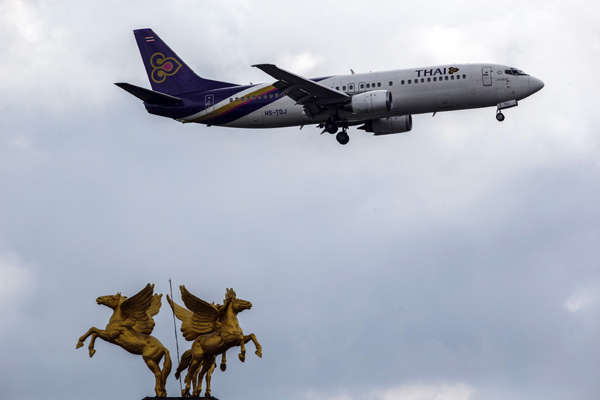China, Japan, S. Korea halt Thai air route expansion on safety concerns
(Agencies) Updated: 2015-04-01 10:40
 |
|
A Thai Airways plane prepares to land at Bangkok's Suvarnabhumi Airport, in this July 17, 2014 file photo. [Photo/Agencies] |
BANGKOK - China has joined South Korea and Japan in stopping Thailand-based airlines from flying charters and new routes because of safety concerns highlighted by an international audit, Thai officials said on Monday.
The move will come as a blow to Thai air carriers that have just begun to recover after a poor 2014 when political protests slashed the number of tourists visiting the Southeast Asian country.
The halt is disrupting the peak travel season around the Thai New Year holiday in April. About 100 charter flights to Japan alone have been cancelled and some 30,000 tickets either refunded or modified, Somchai Piputwat, the director general of Thailand's Department of Civil Aviation (DCA), told reporters.
Budget carriers have been worst hit, Thai officials said, though national carrier Thai Airways International , which is in the midst of a major restructuring, has also been prevented from expanding because of the halt.
One aviation source with knowledge of the matter said that significant safety concerns had been uncovered during an audit of Thailand's civil aviation authority by the Montréal-based International Civil Aviation Organization.
The source said the ICAO's concerns revolved around the issue of operator certificates to carriers by the Thai authority. While the ICAO cannot "downgrade" states, its audits identify concerns that could lead countries to take steps such as banning flights.
"The audit revealed some safety concerns, primarily relating to air operator certification procedures," ICAO spokesman Anthony Philbin said in an email, adding that Thailand had submitted a plan to the ICAO to correct the issues identified.
The US Federal Aviation Administration said it was aware of ICAO's safety concerns, but declined to say whether it was reviewing Thailand's aviation safety status, and referred questions to Thai authorities.
Analysts say an FAA downgrade of Thailand's aviation safety assessment would prevent Thai airlines from launching or expanding service to the United States, either directly or as code-share partners. It would also limit their choice of aircraft and increase inspections of Thai aircraft at US airports.






